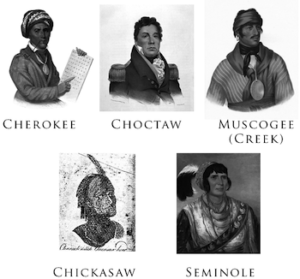
*Black history and the "Five Civilized Tribes" are affirmed on this date in 1500. There has been a long intersectional coexistence between African and Native people in America.
The term "Five Civilized Tribes" originates from the white-American colonial history of the United States. It refers to five Native American nations: the Cherokee, Chickasaw, Choctaw, Creek (Muscogee), and Seminole. These are the first five tribes that white colonials considered "civilized." The tribes of the Southeast adopted George Washington's policy as they established schools, adopted yeoman farming practices, converted to Christianity, and built homes like whites.
Notably, the legal systems among the five tribes reputedly appropriated slavery. Examples of white attributes adopted by these five tribes include Christianity, centralized governments, literacy (English), market sharing, written constitutions, intermarriage with whites, and plantation slavery practices.
The Seminole Native American people were originally in Florida and now reside in Florida and Oklahoma. The Seminole nation came into existence in the 18th century. It comprised renegade and outcast Native Americans from Georgia, Mississippi, Alabama, the Creek Nation, and Africans who escaped slavery in South Carolina and Georgia. The Five Civilized Tribes tended to maintain stable political relations with whites. The term has been criticized for its narrow definition of civilization. George Washington's circulated doctrine held that Native Americans were biologically equal but that their society was inferior. Washington formulated and implemented a policy to encourage the "civilizing" process, which Thomas Jefferson continued.
The Andrew Jackson historian Robert Remini wrote, "They presumed that once the Indians adopted the practice of private property, built homes, farmed, educated their children, and embraced Christianity, these Native Americans would win acceptance from white Americans. Washington's six-point plan included impartial justice toward Indians, regulating the buying of Indian lands, promoting commerce, promoting experiments to civilize or improve Indian society, presidential authority to give presents, and punishing those who violated Indian rights.
The government appointed agents, like Benjamin Hawkins, to live among Indians and to encourage them, through example and instruction, to live like whites.